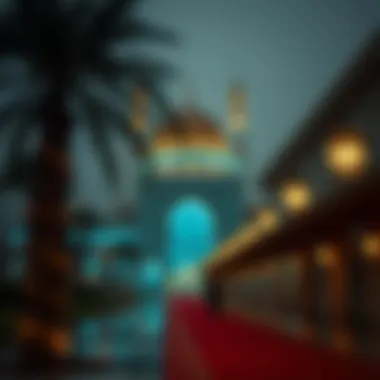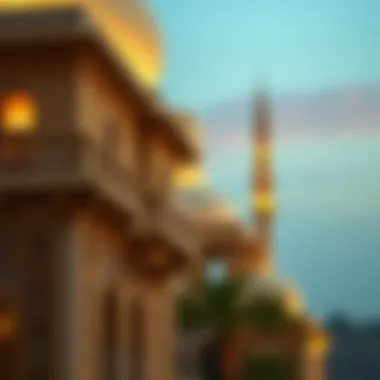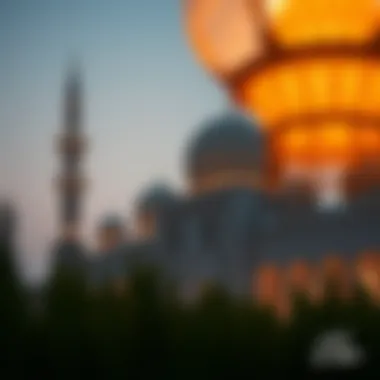Exploring Eid Al Fitr: Traditions and Real Estate Impact


Intro
Eid Al Fitr marks a significant milestone in the Islamic calendar, celebrated by millions across the globe, particularly in the United Arab Emirates. This festive occasion, which signals the end of Ramadan, is not only a time of joyous gathering and communal feasting but also serves as an indicator of cultural pride and economic vibrancy.
In the UAE, Eid Al Fitr brings a unique blend of tradition and modernity. From the rich tapestry of customs observed throughout the holiday to its profound influence on the real estate market, this occasion is more than mere festivity. It brings families and communities together, fostering a sense of belonging and reflection.
Understanding Eid Al Fitr in the context of the UAE is pivotal for various stakeholders, including investors, property managers, and expats keen on engaging with the flourishing real estate landscape in Dubai. Taking a closer look at the customs surrounding the holiday as well as the emerging market trends will provide valuable insight into the broader implications and opportunities that this period offers.
As we delve into the pillars of this celebration, we will explore how Eid Al Fitr shapes not only the cultural landscape but also influences the dynamics of property investments in a city that never sleeps.
Prelude to UAE Holidays
Holidays in the United Arab Emirates are not merely days off from work; they embody a deep-rooted cultural essence that shapes the social fabric of the nation. These moments offer a rich blend of traditions, heritage, and modernity, creating a unique tapestry that resonates across the diverse population of the UAE. As we explore this topic, it becomes apparent that holidays are pivotal in nurturing relationships, fostering community spirit, and enhancing national identity.
Understanding UAE holidays especially aids investors, realtors, expats, developers, and property managers unearth opportunities aligned with cultural events. A well-timed decision can leverage the dynamics brought forth by these holidays, particularly as they influence residential trends and seasonal demand in real estate. The seasonal ebbs and flows tend to create a lively atmosphere which reflects on the market's pulse.
Significance of Holidays in UAE Culture
Holidays play a vital role in the UAE, not only in celebrating events but also in solidifying community values. The country’s diverse population means each holiday can be viewed through various prisms. For instance, Eid Al Fitr, a significant festival, serves as a bridge connecting Muslims through shared rituals and communal prayers.
Moreover, these days break down barriers. Whether it’s a lavish wedding, a family gathering for Eid, or attending one of the many festivals during national holidays, the UAE's communal spirit showcases hospitality and tradition. Such celebrations help foster relationships among people, allowing expats and citizens to mingle, share stories, and partake in cantatas of joy, which might not occur during mundane working days.
In essence, holidays are not simply markers of time off; they are moments to reflect on a shared sense of belonging, to celebrate diversity, and to promote unity across different cultures.
Overview of Major UAE Holidays
The UAE has a calendar rich in holidays that reflect its heritage and Islamic traditions, alongside nationally significant days. Here are some of the holidays that hold great importance:
- Eid Al Fitr: Marks the end of Ramadan, fostering a sense of gratitude and charity.
- Eid Al Adha: Celebrates the willingness to sacrifice and reflects on compassion and the importance of sharing.
- UAE National Day: A day of unity celebrated on December 2nd, marking the federation of the seven emirates.
- Arafah Day: Occurs just before Eid Al Adha, emphasizing reflection and devotion.
- Islamic New Year: Celebrates the start of the lunar calendar, reminding believers of their faith’s essence.
Each holiday brings its own unique connotations and celebrations. Whether they involve family gatherings, elaborate feasts, or community service, major holidays in the UAE allow both residents and visitors to immerse themselves in local customs, etching a significant mark on the societal landscape.
Eid Al Fitr: A Cultural Overview
Eid Al Fitr isn’t just a date on a calendar in the UAE; it represents a rich tapestry of cultural traditions and a time of communal joy that resonates deeply with both natives and expatriates alike. The holiday marks the end of Ramadan, a month dedicated to fasting and reflection, and is a significant event that brings people together, regardless of their different backgrounds. Understanding the essence of Eid Al Fitr is essential not only for cultural appreciation but also for grasping its overarching influence on the society and community dynamics within the UAE.
Meaning and Historical Background
Eid Al Fitr translates to "the festival of breaking the fast." Its origins are deeply rooted in Islamic tradition, commemorating the conclusion of Ramadan, which is the holy month wherein Muslims engage in fasting from dawn until sunset. Historically, the exact date of Eid has varied, based on moon sightings, which introduces a degree of anticipation and community engagement as people await confirmation from local authorities.
- Significance in Islamic History: The observance of Eid Al Fitr was formalized by Prophet Muhammad when he instructed the Muslim community to celebrate this joyous occasion as a reward for their self-discipline during Ramadan. The holiday's timing is also symbolically linked to gratitude—expressing thanks to Allah for the strength shown in fasting.
- Traditions Passed Down: Over the centuries, cultural practices and local customs have woven into the fabric of Eid celebrations in the UAE. Bedouin traditions, for instance, emphasize family reunions, feasting, and giving to those in need. It’s not simply a one-day affair but evolves into a period of extended festivities.
Undoubtedly, these elements create an atmosphere imbued with warmth and gratitude, bridging generations and fostering communal ties.


Religious Significance of Eid Al Fitr
Eid Al Fitr holds profound religious implications for Muslims. It signifies spiritual renewal and a fresh start. The observance begins with a special prayer known as Salat al-Eid, performed in large congregations, often in parks or open fields, illustrating the unity and inclusivity of the Muslim community.
- Charity and Compassion: One distinctive aspect of Eid is the Zakat al-Fitr, a charitable contribution mandated before the Eid prayer. This act embodies the spirit of community support, ensuring that even the less fortunate can partake in the festivities. The very notion of sharing and giving set a moral compass not only for the occasion but for life itself.
- A Time for Reflection: Beyond the rituals, Eid serves as a reminder of the importance of spiritual fulfillment. It encourages adherents to reflect on their faith, committing to continued adherence to the teachings of Islam as they navigate their everyday lives.
This confluence of spirituality, culture, and tradition makes Eid Al Fitr a cornerstone of Emirati social life and an important marker of religious devotion, perhaps serving as a guiding principle for both personal life and professional pursuits.
"In every corner of the UAE, Eid represents a profound gesture of gratitude and a heartfelt reminder of community spirit."
Understanding the significance of Eid Al Fitr not only enhances one's appreciation of the vast cultural fabric of the UAE but also holds potential insights for investors and property managers into the community’s values and priorities. As cultural practices inform market trends, the relevance of this holiday stretches beyond the realm of traditional celebrations, seeping into economic, social, and investment domains.
Observing Eid Al Fitr in the UAE
Eid Al Fitr marks the culmination of Ramadan, and observing it in the UAE unfolds an array of rich customs and practices that play a pivotal role in both personal and communal realms. This observance signifies not only a spiritual closure to the month of fasting but also fosters community engagement—a crucial aspect in the multi-cultural tapestry of the UAE. The enthusiasm that surrounds this holiday invites all, helping weave social bonds and strengthen communal harmony. During this period, residents and expats alike take part in a tapestry of rituals that are meaningful and celebratory.
Traditions and Rituals
From the moment Eid is announced, a palpable anticipation sweeps across the nation. Families engage in several traditions that reflect their faith and culture:
- Eid prayers: Usually conducted early in the morning, men, women, and children flock to mosques and open areas to offer the special Eid prayers. This communal act reinforces sense of belonging.
- Zakat Al Fitr: Before the prayers, it's customary for Muslims to give alms, known as Zakat Al Fitr. This ensures that those in need can partake in the festivities too, highlighting the communal spirit the holiday espouses.
- New Clothes: Many families opt to don new attire for the occasion. The act of dressing in festive clothing aligns with the joy of Eid, marking it as a special day.
Through these practices, Eid Al Fitr not only celebrates an end to abstaining from food and drink but also hails the principles of charity, family, and community spirit.
Prayers and Community Gatherings
The importance of prayers in Eid Al Fitr cannot be overstated. It is not only a religious duty but also an opportunity for community gathering. Mosques and public squares often overflow with worshippers offering their prayers in unison. The atmosphere vibrates with devotion and joy, as families come together, hearts united in gratitude.
- Notable Locations: Various venues like the Sheikh Zayed Grand Mosque or Dubai's Al Farooq Omar Mosque become focal points during Eid. These sites can accommodate large crowds and often host special events after the prayers.
- Breaking Bread: Following prayers, families often come together for communal meals, emphasizing unity. It’s common to see gatherings where relatives and friends share in laughter and conversation.
Thus, along with the prayers, these acts highlight the overlooking significance of community strength, reinforcing social ties.
Culinary Celebrations during Eid
Food is a central component of Eid Al Fitr celebrations, with families indulging in traditional dishes that vary across regions. The culinary richness serves not just to satisfy hunger but as a symbol of abundance and gratitude.
- Sweet Treats: Items like Kleicha, a stuffed pastry, and Maamoul, date-filled cookies, are popular indulgences during Eid. These are often shared among neighbors and friends, reinforcing connections.
- Savory Dishes: Main courses typically include lamb, chicken, or beef dishes, prepared with an array of spices. The meals go beyond sustenance; they are emblematic of hospitality, reflecting the generosity of spirit amongst families.
- Festive Gatherings: Food transcends mere consumption, acting as a backdrop for familial bonds. It features prominently in gatherings where stories are shared, laughter rings out, and rich familial ties grow ever stronger.
Observing Eid Al Fitr in the UAE combines religious duties with vibrant cultural practices. It fosters community spirit, enhances familial bonds, and provides an opportunity to celebrate diversity through shared traditions and culinary delights. This holiday not only shines a light on individual beliefs but portrays a collective ethos that remains intrinsic to the UAE's identity.
"The joy of Eid Al Fitr spreads through the hearts of many, stitching together a rich fabric of culture and community in the UAE."
For further reading on Eid traditions, you can check the Wikipedia page on Eid Al Fitr for more insights.


Impact of Eid Al Fitr on UAE Society
Eid Al Fitr, marking the end of Ramadan, carries profound implications for UAE society. It’s not just a religious observance; it serves as a cultural cornerstone that meshes together thousands of years of tradition and the modern dynamics of a globalized society. The significance of the holiday extends beyond mere festivities; it is a unique expression of community, family values, and economic vitality that influences daily life in myriad ways.
Economical Influence of the Holiday
Economically, Eid Al Fitr acts as a significant catalyst for various sectors within the UAE. The retail industry particularly gains substantial momentum during this period. Shoppers flock to malls, markets, and online platforms, drawn by promotions and special offers that retailers roll out. This surge not only boosts sales for major brands but also helps small businesses thrive. Local vendors offering traditional delicacies or unique gifts often see customers lining up, eager to partake in the spirited commerce.
Moreover, tourism sees a spike during Eid as many expatriates travel back home or invite family members to spend the holiday together. This influx bolsters hotel occupancy rates and dining establishments, creating a ripple effect on employment opportunities within these sectors. In a broader sense, it illustrates a flourishing economy, where celebrations translate into tangible financial benefits.
Social Gatherings and Family Dynamics
At its core, Eid Al Fitr is about unity and shared experiences among family and friends. Social gatherings, whether they happen in charming homes or extravagant venues, become a norm. The communal aspect of this festival fosters stronger family dynamics, allowing relatives to reconnect and celebrate their bonds. In a fast-paced world, these moments are cherished deeply.
Families spend days preparing scrumptious feasts, each dish echoing the essence of their heritage. From the sweet taste of baklava to savory dishes filled with spices, culinary delights play a crucial role in the celebrations. It's more than just food; it's about heritage and identity, with each family adding their own twist to traditional recipes.
"Eid is the time to recharge familial ties and strengthen community bonds."
These gatherings often encompass friendships formed over years, where families come together to share stories and create memories anew. In this blend of cultures, traditions also vary by community, enriching the experience for all participants. It's a testament to the diversity that defines the UAE today, as people from different backgrounds come together in harmony.
In summary, Eid Al Fitr significantly shapes the socio-economic landscape in the UAE. It’s a festival that transforms into opportunity—economically invigorating businesses while socially strengthening community ties. As investors or those involved in property management observe these patterns, they can glean insights into market behaviors driven by such culturally significant events.
Real Estate Considerations During Eid Al Fitr
When you think about holidays in the UAE, it's easy to focus solely on the cultural and religious aspects, but there's also a significant side that often gets overlooked—real estate considerations. Especially during Eid Al Fitr, the real estate market experiences unique twists and turns that can influence developers, investors, and property managers alike. Understanding these dynamics can pave the way for more informed decisions, enhancing the prospects of profit and ensuring smooth operations.
Market Trends during Holiday Periods
Eid Al Fitr not only marks the end of Ramadan but also a shift in consumer behavior. Parents shopping for new homes before the new school year, families looking for bigger spaces after traditional visits, and expatriates seizing holiday promotions all contribute to noticeable market trends. Homes in key areas such as Dubai Marina or Downtown Dubai tend to attract more interest as families seek not just a place to live, but a lifestyle conducive to gatherings and celebrations.
Interestingly, some landlords capitalize on this demand surge by offering limited-time discounts or free utilities as incentives for renters. Such strategies often see a rise in short-term rentals and a stiffening of competition among property owners who want to capture the attention of potential tenants. Alongside traditional sectors, luxury properties see a splurge in interest with the influx of visitors during the holiday period. As people begin to entertain guests, the demand for spacious homes increases.
"During Eid, the real estate market doesn’t just maintain its pulse; it quickens, reflecting the vibrant culture and demands of its residents."
Investment Opportunities Arising from Seasonal Demand
The holiday season is ripe with investment opportunities for both seasoned players and those dipping their toes into the local market. Developers can shift focus temporarily towards vacation rentals, especially in areas that attract tourists. Designs that cater to family reunions or large gatherings can command impressive rental returns. Furthermore, financing options may also tighten as banks see fluctuations in loan applications during this festive period; thus, being prepared with pre-approved loans can provide investors an edge.
For example, some investors specialize in turnkey properties, managing everything from maintenance to marketing for property owners. This service becomes increasingly essential during Eid as homeowners prioritize quality family time over day-to-day responsibilities.
Effects on Property Management Practices
The responsibilities of property management often stretch beyond the usual marketing or maintenance tasks during holidays like Eid Al Fitr. Property managers might need to implement specific strategies to accommodate the increased traffic of visitors, as well as the demands of tenants preparing for gatherings. Good communication remains key; proactive outreach to tenants can help manage expectations and enhance satisfaction.


Additionally, managers should consider the cultural implications of the holiday. Property association rules concerning noise levels, guest accommodations, and communal space usage may need temporary adjustments to foster a spirit of community and festivity among residents. Also, seasonal decorations can brighten up the properties and make them feel more inviting. It's these small touches that often leave a mark, enhancing the reputation of property management firms.
Navigating Real Estate During Holidays
Understanding the nuances of navigating the real estate landscape during holidays, particularly Eid Al Fitr, proves to be essential for investors, buyers, and renters alike. As this festive season draws families together and elevates community spirits, it simultaneously sets the stage for unique shifts in the property market. With its blend of cultural significance and economic implications, Eid Al Fitr cannot be overlooked by those involved in real estate activities.
Real estate is not just about buying or selling properties; it involves understanding the ambience and behavior of the market during festive seasons. Investors and buyers may find varied opportunities and challenges due to altered supply, demand, and pricing trends during holidays. This section aims to provide insights into how to effectively navigate the real estate scene during Eid Al Fitr, ensuring that participants make informed decisions that align with their investments or accommodation needs.
Advice for Investors and Buyers
For investors and buyers, exploring the market during Eid Al Fitr can be a double-edged sword. Here are some key considerations:
- Seasonal Demand Fluctuations: During this holiday, the demand for properties often experiences a spike as families seek housing to accommodate visiting relatives or take advantage of offers from realty firms capitalizing on festive spending. Understanding these trends can help investors position themselves effectively.
- Negotiation Leverage: With many sellers eager to close deals before or during Eid Al Fitr, you might have the upper hand in negotiations. Many sellers may be motivated by the holiday spirit to make faster transactions, providing investors a chance to secure properties at favorable rates.
- Regional Insights: Keep an eye on specific neighborhoods showing increased activity. Areas like Dubai Marina or Downtown Dubai often see heightened interest during Eid, given their proximity to celebrations.
- Real Estate Partnerships: Collaborating with local real estate agents familiar with the holiday trends could be particularly advantageous. They can provide a wealth of knowledge on available properties, pricing strategies, and other insights.
In summary, during Eid Al Fitr, a keen understanding of the market dynamics will position investors and buyers to capitalize on unique opportunities.
Tips for Renters in Holiday Seasons
The holiday season presents both challenges and avenues for renters looking for homes during Eid Al Fitr. Here’s a list of practical tips:
- Start Early: Begin your search well in advance of Eid. As the holiday approaches, demand surges, and properties can get snatched up quickly, especially family-sized rentals.
- Flexible Options: Be open to negotiations on lease terms. Some landlords might be more willing to adjust pricing or conditions during the festivities, aiming to attract tenants who prefer stability during the holiday season.
- Explore Different Locations: While popular locations may seem appealing, consider emerging neighborhoods that might offer better deals during Eid. Often, you can find hidden gems that are not on everyone’s radar.
- Communicate Clearly: When engaging with landlords or rental agencies, express your needs and timeline. Given that many families are busy with celebrations, an upfront discussion can lead to smoother negotiations.
Renting during Eid Al Fitr can be a rewarding experience if approached with the right strategy and mindset. "Embracing the holiday spirit while maintaining focus on your rental needs can lead to unexpectedly great opportunities."
By staying prepared and being aware of the cyclical patterns present in the real estate market during Eid, renters can position themselves for success.
For further information on holiday trends in UAE real estate, consider checking Dubai Land Department or consult property-related discussions on sites like Reddit.
End
In reflecting on the multifaceted nature of Eid Al Fitr within the UAE, the importance of the conclusion cannot be understated. This celebration is not merely a religious observance; it encompasses cultural significance, familial bonds, and economic impact that resonate through various layers of society. By synthesizing knowledge across these dimensions, we can appreciate how Eid Al Fitr unites individuals and communities while shaping trends and practices.
The Enduring Relevance of Eid Al Fitr in UAE
Eid Al Fitr holds a lasting significance in the UAE, transcending its role as a religious holiday. It is a time that embodies generosity and charity, seeking to strengthen community ties. Many families find themselves reuniting during this time, sharing meals, and exchanging gifts, deepening their relationships.
The holiday also provides a platform for showcasing local traditions to an increasingly diverse expatriate community. Through shared experiences, the cultural landscape of the UAE continues to flourish. This fosters understanding and adaptability, encouraging a blend of customs where city life meets tradition.
Eid Al Fitr also sees a boom in various economic sectors, with retail and hospitality benefitting immensely from heightened consumer spending. As shops roll out festive discounts and restaurants curate special menus, there's a palpable shift in the bustling atmosphere of every Emirati locale. Thus, the holiday not only reinforces cultural identities but also acts as a catalyst for economic vitality.
Final Thoughts on Real Estate Trends Linked to Holidays
The real estate landscape interweaves spectacularly with the rhythms of Eid Al Fitr. As families gather and celebrate, there is a rise in demand for larger accommodations, reflecting the need for space to host relatives and enjoy traditional meals together. Realtors should pay attention to these trends, predicting changes in property demand that accompany the holiday season.
Moreover, investors looking at the UAE real estate market would do well to consider these holiday-related fluctuations. Properties situated near community centers that host Eid events or luxurious developments peppered with festive illuminations tend to attract more interest. Understanding these elements can guide investment strategies and inform property management practices.
To summarize, engaging with the cultural fabric of Eid Al Fitr provides valuable insights into the larger picture of society within the UAE. It’s not just about celebration; it encompasses community, economics, and real estate trends all tied together in a vibrant tapestry. Thus, recognizing the relevance of such holidays is crucial for anyone looking to invest or thrive in this dynamic market.
"Eid Al Fitr symbolizes hope and connection, rooting us all in a shared humanity beyond our differences."
For further understanding of Islamic customs and their impact on modern society, resources such as Encyclopaedia Britannica and relevant studies on Saudi Gazette can be explored.















